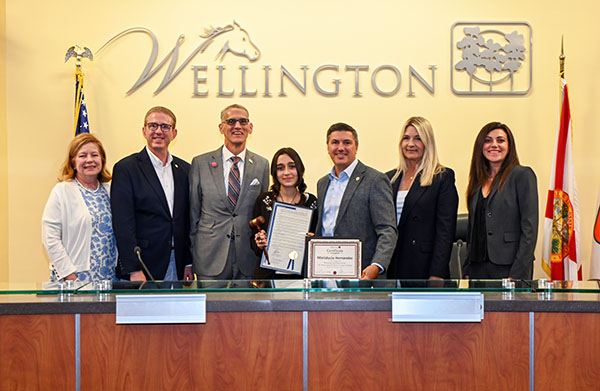
A Wellington resident with a $450,000 homesteaded property can expect to pay about $33 more in municipal taxes next year due to rising property values, even if the village’s property-tax rates stay the same in the budget for fiscal year 2025, according to estimates from Wellington officials.
Throw in $20 more for typical curbside waste pickup and another $7.47 on the average monthly water bill, and it means that costs will creep up a bit, Deputy Village Manager Tanya Quickel told the Wellington Village Council on Tuesday, July 16.
“So, while the millage rate is unchanged, homeowners may still see an increase in their taxes if their property value increased,” Quickel said.
Rising property values have produced more money for Wellington’s budget for the 12th consecutive year, helping boost it by $10 million to almost $148 million for fiscal year 2025.
Final budget numbers require council approval, scheduled for consideration in September after workshops and discussions in the interim.
At the July 16 meeting, the council unanimously approved preliminary steps that keep the tax rate unchanged at 2.47 mills, and also approved the assessments for the Acme Improvement District and other village entities.
Mayor Michael Napoleone praised staff for working to keep the millage rate the same after concerns it might have to get “tweaked up” in a period of inflation for goods and services.
“The one place where people have complained about things going up is utility bills,” Napoleone said.
He wanted residents to understand investments in the village-run water utility have been designed to be spread out over multiple years to address issues like “forever chemicals.” That refers to chemicals in products like non-stick cookware, rugs, stain-resistant clothing or food packaging that don’t break down in the environment and can get into the water supply. Health effects have been under study.
The point is to make sure “the utility is the safest and best-run we can have,” Napoleone said.
Property values in the Village of Wellington have climbed 9 percent, leading to an increase in tax revenue for next year’s budget of $2.25 million.
For the owner of a non-homesteaded $450,000 property, it could translate to $111 more in taxes. For a $650,000 homesteaded property, it could be $48 more, or $161 without the homestead designation denoting a primary residence that carries protections limiting tax increases.
The budget accommodates the construction of projects such as a new $30 million aquatic center in Village Park, aided in part by proceeds from an expiring countywide sales surtax for school and civic improvements.
The ledger anticipates spending $1.2 million in fiscal year 2025 toward adding six courts to the village’s tennis facility, supplemented by outside grants. There is also $1 million earmarked for public safety facilities.
The village’s budget aims $1 million toward a roundabout at Lake Worth Road and 120th Street South, designed to guide traffic around a central island and avoid backups at a traffic light.
The village’s proposed budget stands at $147.9 million, an increase of 7.4 percent from the current year.
Meanwhile, curbside waste fees coordinated with county authorities will go up $20 to $310, and container fees for businesses will bump up $5 to $230.
Water utility fees are seeing the second of three 10 percent planned annual increases, an average increase of $7.47 per month for 2025.
Much of the proposed spending is directed at utility capital projects, involving meter replacement and water system improvements, including upgraded “membrane” systems to filter out contaminants, Quickel said. Updated details of those projects will be presented at a workshop Aug. 12.
In other action, the council approved a change to village rules to allow hedges between six and eight feet along major thoroughfares, and the grandfathering of allowed hedge plants beyond a narrowed five types if they are well maintained. A 2021 change mandated eight feet, but that proved less than ideal for some property owners who maintain their own hedges. The council approved the change 5-0.







